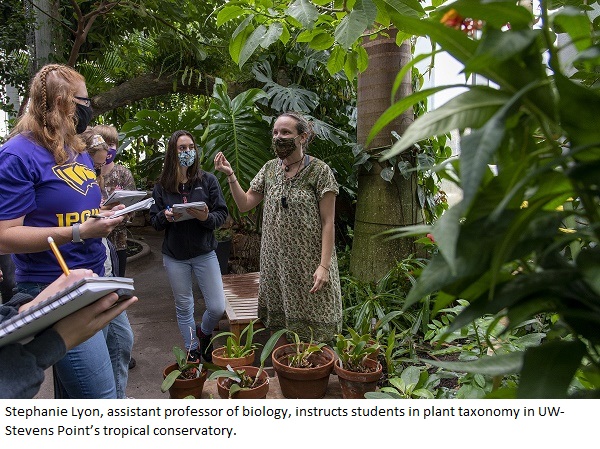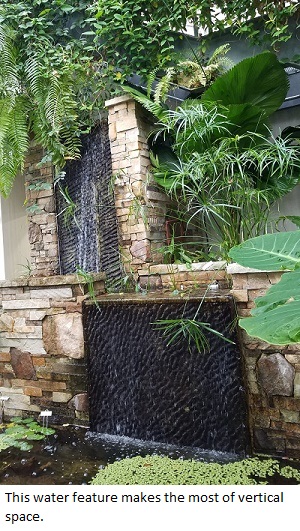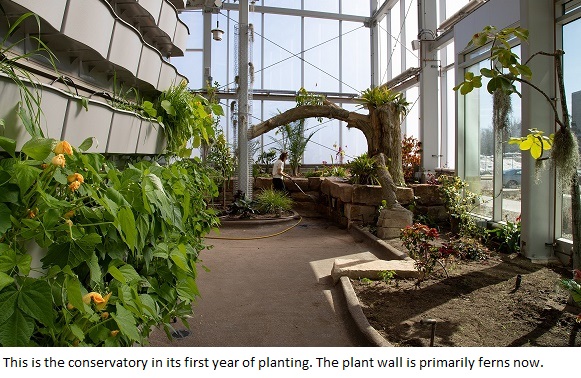Escaping winter without leaving campus
 The most inviting location at UW-Stevens Point in the cold of winter is the tropical conservatory. This lush oasis, located in the Chemistry Biology Building, is simply 77-86 degrees of wonderful.
The most inviting location at UW-Stevens Point in the cold of winter is the tropical conservatory. This lush oasis, located in the Chemistry Biology Building, is simply 77-86 degrees of wonderful.
From ferns and colorful foliage to palms and philodendron, the conservatory showcases plants from tropical and subtropical regions throughout the world. Greenery includes giant taro and dainty epiphytes, vines, trees and aquatic plants. Orchids, chenilleand shrimp plants are in bloom in January. Enjoy the soothing sound of a water feature. See medicinal and edible plants with economic value, such as cassava, chocolate, coffee, cardamom and other spices. A calamondin orange tree is bearing fruit.
The conservatory currently includes 103 vascular plant families and 400 different species and cultivars from Central and South America, Africa, Asia and the Pacific islands. "You get a feel for what it might be like to wander into a tropical rainforest in that part of the world," said Stephanie Lyon, assistant professor of biology and conservatory director.
While it's open to anyone, "students studying plants have priority," she said. The conservatory is a living classroom and diverse resource for labs where plant structures and features of various plant families are studied.
Students in several biology courses – plant taxonomy, botany, introductory biology, plant physiology, entomology, ethnobotany – use the space. "I use it every week all semester long. I get a lot of my teaching specimens -- flowers and smaller leaf samples for students to look at under microscope -- from the conservatory," Lyon said.
 Before the conservatory opened, plants were grown in large containers in rooftop greenhouses on two academic buildings and carted to classrooms, sometimes in other buildings. When planning for the Chemistry Biology Building was underway, a seed germinated: "Wouldn't it be great if we had a good place to store our plants, like a greenhouse? Wouldn't it be even better if we could put those plants in the ground, and bring the students to the plants, rather than having to bring the plants to the students?" Lyon said.
Before the conservatory opened, plants were grown in large containers in rooftop greenhouses on two academic buildings and carted to classrooms, sometimes in other buildings. When planning for the Chemistry Biology Building was underway, a seed germinated: "Wouldn't it be great if we had a good place to store our plants, like a greenhouse? Wouldn't it be even better if we could put those plants in the ground, and bring the students to the plants, rather than having to bring the plants to the students?" Lyon said.
Botany Coordinator John Hardy, recently retired, was instrumental in designing the conservatory. With his extensive knowledge of greenhouse plants and wish lists from faculty, he created detailed plans for the lush, forest-like environment. He was able to greatly expand the diversity of the Biology Department's living plant collections.
Classes were first held in the new building in fall 2018, and the conservatory opened in 2019. Students helped with much of the planting, including some plants that had spent years in containers in UW-Stevens Point greenhouses. Planting in a conservatory allowed large specimens – including seedlings of avocado and cherimoya trees -- to take root and flourish. The largest specimen is a 30-foot-tall Cuban royal palm.
Plant diversity continues to deepen. "I try to optimize this collection for teaching plant taxonomy so I would have several representatives from whatever taxa we are learning about that week," Lyon said.
Four student workers maintain the conservatory. Even similar plants have varying water and light needs, and some grow more robustly, shading others. So pruning is a major task to keep everything in check, Lyon said. The conservatory uses no pesticides.
The student crew leader is Bethany Kuczmarski, a senior majoring in biology. "Working in the conservatory has been and continues to be a phenomenal experience," she said. "This job has provided ample opportunities for personal growth as well as infinite learning moments with knowledge of plant families, plant identification and classification."
The conservatory is special and unusual, Lyon said. "I don't know that I've ever been to a university campus where a big tropical greenhouse was as accessible and intentionally diverse. Even at UW-Madison, the botany greenhouses are open by appointment only. We're probably similar in diversity to the much larger Olbrich Conservatory in Madison."
The tropical conservatory is open to campus and the community at no charge. Donations are welcome.

